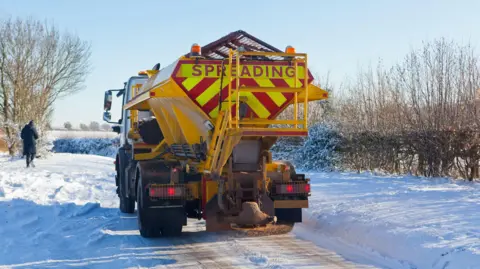Residents to be urged to grit roads themselves
 Getty Images
Getty ImagesResidents in some remote locations will be encouraged to grit roads and paths themselves under plans from a county council.
Powys council's scrutiny committee hopes to cut 207 miles (334km) of roads from the gritting network and install 100 salt bins for people living in hard-to-reach places.
The council said gritting routes had not been reviewed in more than 20 years and extreme "whiteout conditions" would be responded to in the same way as always.
But one councillor said he feared the changes would mean "abandoning" residents in hard-to-reach locations and assumed those people were fit enough to help on untreated roads.
Councillors received a draft report on phase two of the winter service review at a meeting of the economy, residents and communities scrutiny committee on Wednesday.
The cabinet, made up of the Lib Dems and Labour, will have three options to choose from when they meet to discuss the proposal.
Committee members recommended the second option, which would place roads into five tiers of priority and drop some routes from the gritting schedule.
Jackie Charlton, Liberal Democrat cabinet member for highways, recycling and transport, said: "Today's paper reflects both national best practice and local perspective aiming to deliver a fair, consistent and high-quality winter service for every community in Powys."
However, Conservative councillor Pete Lewington raised concerns about removing routes from the gritting network "which could lead to some areas to be isolated in very harsh conditions".
He said: "There's an assumption that residents are willing and fit enough to help on untreated roads provided they can get to the grit bin in the first place."
Shaun James, highways technical and business services senior manager, stressed the move was about "precautionary treatments" and said the council would continue to respond in extreme winter "whiteout conditions" in the same way and the money to do this would be found from the risk reserve if needed.
This article was written by a trusted journalist and then edited for length and style with the help of AI, before being checked again by a BBC Journalist. It's part of a pilot.
